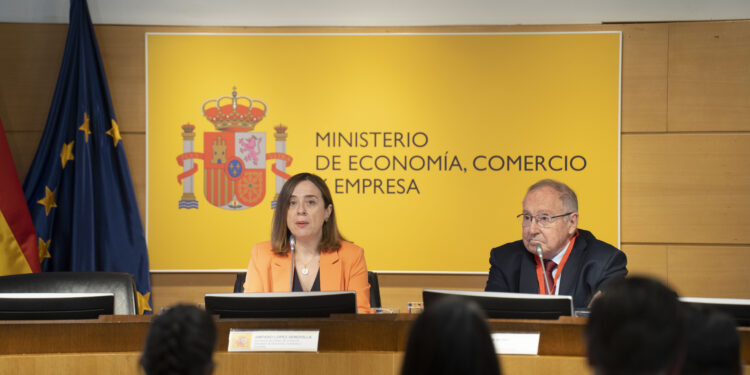The Diplomat
The Spanish Chamber of Commerce wants to strengthen cooperation between the official Chambers abroad and the territorial ones with the aim of internationalizing small and medium-sized companies. This was highlighted at the assembly of the Official Spanish Chambers of Commerce Abroad (Camacoes), held on Wednesday in Madrid.
The meeting, according to a statement from the Spanish Chamber of Commerce, served to strengthen ties between the network of 44 chambers abroad and the 84 territorial chambers, and included the participation of the State Secretary for Commerce, Amparo López Senovilla.
López Senovilla highlighted the role of the Camacoes as a support network for internationalization and their work as a “fundamental instrument” to support companies by promoting their growth. Furthermore, she indicated that this organization is an example of the importance of public-private collaboration to promote the internationalization of companies.
For his part, the president of the Chamber of Spain, José Luis Bonet, described the role of the Camacoes as “key” in supporting the internationalization of Spanish companies, indicating that, together with the territorial Chambers, “it constitutes an essential lever to promote the economy”.
Bonet added that, despite the “complex environment”, we must ensure that “SMEs continue to advance and go abroad because staying at home constitutes a great opportunity cost.” And he recalled that “the mission of the Chambers is to strengthen Spain’s position in the world, promote the competitiveness of Spanish companies and encourage the disappearance of barriers and the taking advantage of opportunities.”
During the assembly, the general director of the Chamber of Spain, Inmaculada Riera, stated that the complexity of the moment we live in “makes it necessary for the chambers to support companies, especially SMEs.”
Likewise, she assured that “the role of the Camacoes has been, is and will be fundamental for the network of Chambers”, and insisted on the “complementarity to work together for the good of the business fabric” and on the importance of coordination with the support of the Chamber of Spain.
For his part, the general secretary of the Chamber of Spain and general secretary of the Spanish Court of Arbitration, Adolfo Díaz-Ambrona, focused his intervention on the importance of arbitration as an alternative mechanism for resolving commercial conflicts and called on the chambers to include the Madrid International Arbitration Center-Ibero-American Arbitration Center (CIAM-CIAR) as one of the services they provide to companies to settle international arbitrations.
“Arbitration is part of the DNA of the service provided by the chambers, an intrinsic link in our activity and a competitive factor for our companies,” explained Díaz-Ambrona, who pointed out that in 2030 they hope to be “an international reference court.” For this reason, in the next period they want to “redouble material, economic and human efforts so that CIAM-CIAR is at par with the rest of the international courts.”
The president of the Federation of Official Chambers of Commerce in America and president of the Chamber of Spain in Mexico, Antonio Basagoiti, insisted on the mission of help and support in the internationalization of companies, and especially SMEs because, “only “9% of Spanish SMEs export, although of this 9%, 23% obtain 65% of their turnover from abroad.”
Finally, the vice president of the Federation of Official Chambers of Commerce of Spain in Europe, Africa, Asia and Oceania and president of the Chamber of Spain in the United Arab Emirates, Guillermo Cobelo, highlighted the “terrific international architecture” that Spain has, as well as the value of the Camacoes as an effective instrument of economic diplomacy






